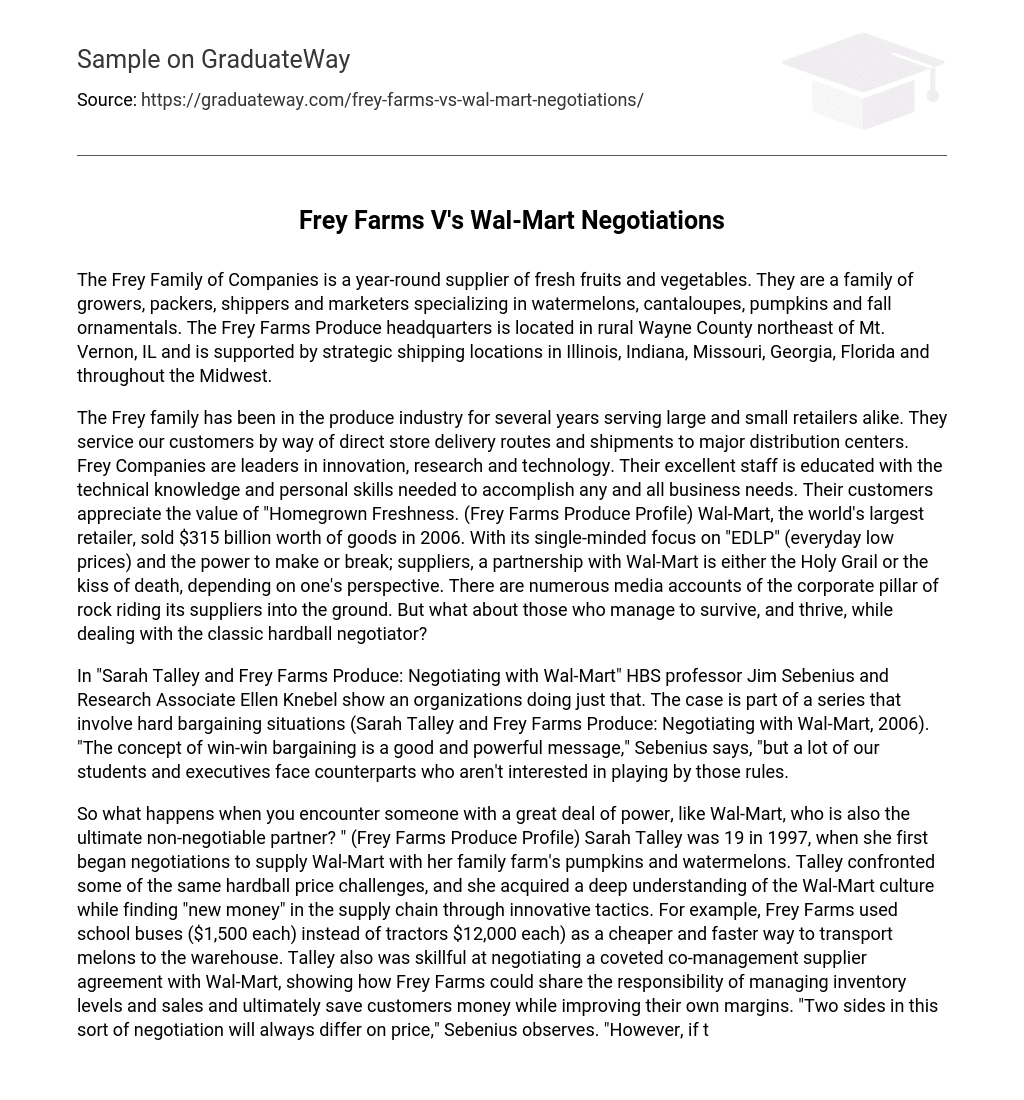The Frey Family of Companies is a year-round supplier of fresh fruits and vegetables. They are a family of growers, packers, shippers and marketers specializing in watermelons, cantaloupes, pumpkins and fall ornamentals. The Frey Farms Produce headquarters is located in rural Wayne County northeast of Mt. Vernon, IL and is supported by strategic shipping locations in Illinois, Indiana, Missouri, Georgia, Florida and throughout the Midwest.
The Frey family has been in the produce industry for several years serving large and small retailers alike. They service our customers by way of direct store delivery routes and shipments to major distribution centers. Frey Companies are leaders in innovation, research and technology. Their excellent staff is educated with the technical knowledge and personal skills needed to accomplish any and all business needs. Their customers appreciate the value of “Homegrown Freshness. (Frey Farms Produce Profile) Wal-Mart, the world’s largest retailer, sold $315 billion worth of goods in 2006. With its single-minded focus on “EDLP” (everyday low prices) and the power to make or break; suppliers, a partnership with Wal-Mart is either the Holy Grail or the kiss of death, depending on one’s perspective. There are numerous media accounts of the corporate pillar of rock riding its suppliers into the ground. But what about those who manage to survive, and thrive, while dealing with the classic hardball negotiator?
In “Sarah Talley and Frey Farms Produce: Negotiating with Wal-Mart” HBS professor Jim Sebenius and Research Associate Ellen Knebel show an organizations doing just that. The case is part of a series that involve hard bargaining situations (Sarah Talley and Frey Farms Produce: Negotiating with Wal-Mart, 2006). “The concept of win-win bargaining is a good and powerful message,” Sebenius says, “but a lot of our students and executives face counterparts who aren’t interested in playing by those rules.
So what happens when you encounter someone with a great deal of power, like Wal-Mart, who is also the ultimate non-negotiable partner? ” (Frey Farms Produce Profile) Sarah Talley was 19 in 1997, when she first began negotiations to supply Wal-Mart with her family farm’s pumpkins and watermelons. Talley confronted some of the same hardball price challenges, and she acquired a deep understanding of the Wal-Mart culture while finding “new money” in the supply chain through innovative tactics. For example, Frey Farms used school buses ($1,500 each) instead of tractors $12,000 each) as a cheaper and faster way to transport melons to the warehouse. Talley also was skillful at negotiating a coveted co-management supplier agreement with Wal-Mart, showing how Frey Farms could share the responsibility of managing inventory levels and sales and ultimately save customers money while improving their own margins. “Two sides in this sort of negotiation will always differ on price,” Sebenius observes. “However, if that conflict is the centerpiece of their interaction, then it’s a bad situation.
If they’re trying to develop the customer, the relationship, and sales, the price piece will be one of many points, most of which they’re aligned on. ” Sarah Talley Has the Following Key Negotiation Principles When you have a problem, when there’s something you engage in with Wal-Mart that requires agreement so that it becomes a negotiation, the first advice is to think in partnership terms, really focus on a common goal, of getting costs out, for example, and ask questions. Don’t make demands or statements… ou know, can we do this better and so forth. If the relationship with Wal-Mart is truly a partnership, negotiating to resolve differences should not endanger the tenor of the partnership. Don’t spend time griping. Be problem solvers instead. Approach Wal-Mart by saying, “Let’s work together and drive costs down and produce it so much cheaper you don’t have to replace me, because if you work with me I could do it better. ” Learn from and lobby with people and their partners who have credibility, and with people having problems in the field.
Don’t ignore small issues or let things fester. Do not let Wal-Mart become more than 20% of your company’s business. It’s hard to negotiate with a company that controls yours. Never go into a meeting without a clear agenda. Make good use of the buyers’ face time. Leave with answers. Don’t make small talk. Get to the point; their time is valuable. Bring underlying issues to the surface. Attack them head on and find resolution face to face. Trying to bluff Wal-Mart is never a good idea. There is always someone willing to do it cheaper to gain the business.
You have to treat the relationship as a marriage. Communication and compromise is key. Don’t take for granted that just because the buyer is young they don’t know what they are talking about or that it will be an easy sell. Most young buyers are very ambitious to move up within the company and can be some of the toughest, most educated buyers you will encounter. Know your product all the way from the production standpoint to the end use. Chances are your buyer does, and will expect you to be even more knowledgeable.
Sarah Talley showed many negotiating skills. Due to her key negotiation principles she has become an exceptionally successful entrepreneur and skilled negotiator.
Works Cited Frey Farms Produce Profile. (n. d. ). Retrieved February 20, 2010, from Frey Farms Produce: http://www. freyproduce. com/profile. htm Sarah Talley and Frey Farms Produce: Negotiating with Wal-Mart. (2006, November 8). Retrieved February 20, 2010, from Harvard Business Publishing: http://doi. contentdirections. com/mr/hbsp. jsp? doi=10. 1225/907003





